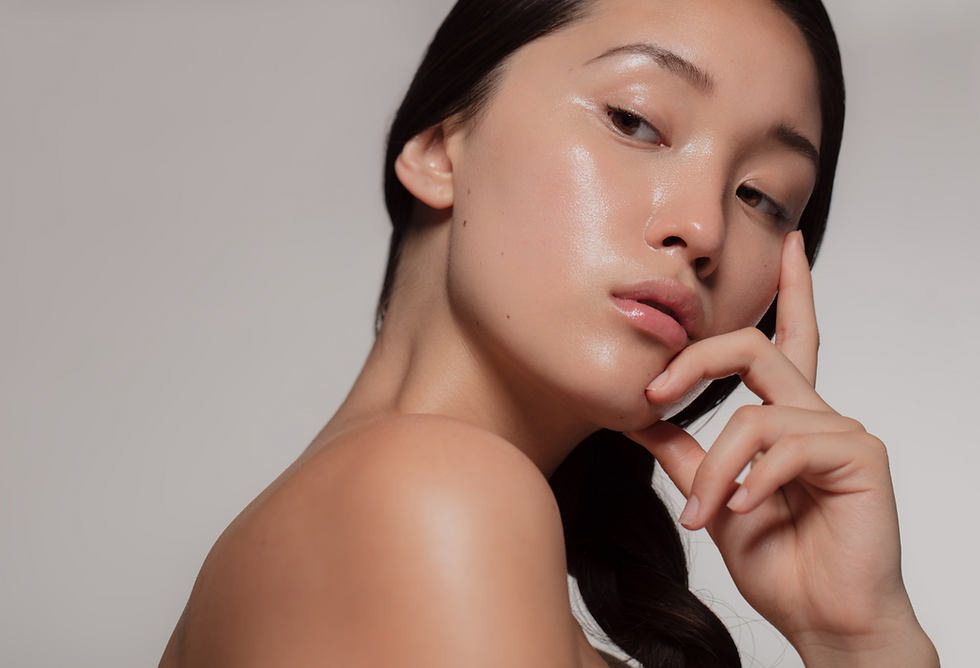AHA vs BHA? How to Exfoliate Skin with the Right Acid
- Dec 16, 2024
- 3 min read
Updated: Jan 19
You've seen the alphabet soup of acids promising smoother skin. AHAs. BHAs. Glycolic. Salicylic. Every product claims to be essential.
Most people don't need all of them.
When deciding between AHA vs BHA, the difference comes down to where each acid works and what it targets. AHAs are water-soluble acids that exfoliate the skin's surface by dissolving the bonds between dead cells, improving texture, fine lines, and dullness. BHA is oil-soluble, which means it penetrates into pores to clear congestion, reduce blackheads, and control oil production. Choose AHA for surface-level concerns like texture and tone, or BHA for deeper issues like clogged pores and acne.
That's it. Everything else is details about which specific acid and concentration to use.

What AHA Actually Does to Your Skin
AHAs break down the glue holding dead skin cells together. Think of them as chemical scissors cutting through cellular buildup on your skin's surface.
The most common types are glycolic acid from sugarcane, lactic acid from milk, and mandelic acid from almonds. Each works slightly differently based on molecular size.
Glycolic acid has the smallest molecules, so it penetrates fastest and works most aggressively. Lactic acid is gentler and adds hydration. Mandelic acid is the largest and slowest, making it ideal for sensitive skin or first-time acid users.
AHAs improve skin texture and tone by speeding up cell turnover. Your skin naturally sheds dead cells every 28 days. AHAs accelerate that process, revealing fresher cells underneath faster. This helps with dullness, fine lines, and uneven pigmentation.
The tradeoff is sun sensitivity. AHAs make your skin more vulnerable to UV damage temporarily, which matters if you're dealing with hyperpigmentation or melasma.
How BHA Works Differently
Salicylic acid is the only BHA used in skincare. It's oil-soluble, which changes everything about how it functions and how to exfoliate skin effectively with this acid type.
Instead of working on the surface, BHA travels through sebum into your pores. Once inside, it dissolves the debris causing congestion—dead skin cells, excess oil, bacteria.
This makes BHA significantly more effective for acne, blackheads, and oily skin than AHAs. It also has anti-inflammatory properties that calm redness and irritation while it clears pores.
BHA doesn't increase sun sensitivity as dramatically as AHAs, though you should still use sunscreen. It works well for people dealing with both acne and hyperpigmentation because it addresses breakouts without worsening dark spots through UV exposure.
How to Choose Between AHA vs BHA for Your Skin Type
If your main complaint is rough texture, dullness, or fine lines, start with AHA. Begin with 5-7% lactic acid if your skin tends toward sensitivity, or 8-10% glycolic acid if your skin tolerates actives well.
For persistent congestion, blackheads, or active breakouts, BHA works better. Look for 1-2% salicylic acid concentrations. Lower percentages still work—they just take longer to show results.
Combination skin often needs both acids, but knowing how to exfoliate skin properly means not using them at the same time. Use BHA on your T-zone where oil accumulates. Apply AHA to dry areas that need texture improvement. Or alternate them on different nights rather than layering.
If you're building tolerance to retinol or other actives, add acids slowly. Your skin barrier can only handle so much exfoliation before it starts breaking down.
How to Exfoliate Skin with Acids Safely
Start with twice weekly use, always at night. Your skin needs time to adjust to increased cell turnover.
Apply acid products after cleansing, before heavier serums or moisturizers. Wait three to five minutes before adding other products. This gives the acid time to work at its optimal pH without interference.
Increase frequency gradually based on how your skin responds. Some people tolerate daily use. Others max out at three times per week. Neither approach is better—it depends entirely on your individual skin resilience.
Always use sunscreen the next morning. AHAs increase photosensitivity significantly. BHA does too, though less dramatically. Skipping sun protection while using acids is how people end up with worse pigmentation than they started with.
When Your Skin Tells You to Stop
Mild tingling during application is normal. Burning, stinging, or prolonged redness means you're using too strong a concentration or applying too frequently.
If your skin feels tight, looks shiny, or starts peeling in sheets, you've damaged your barrier through over-exfoliation. Stop all acids immediately. Focus on gentle hydration and barrier repair until your skin recovers.
New breakouts in unusual places often signal irritation rather than purging. True purging from acids happens where you normally break out, and it resolves within a few weeks. Irritation breakouts appear in unexpected areas and persist until you stop the irritating product.
Results take time. Expect to wait four to six weeks before seeing noticeable improvement in texture or congestion. If you're not seeing any change after two months of consistent use, either your concentration is too low or you're addressing the wrong concern with the wrong acid.



